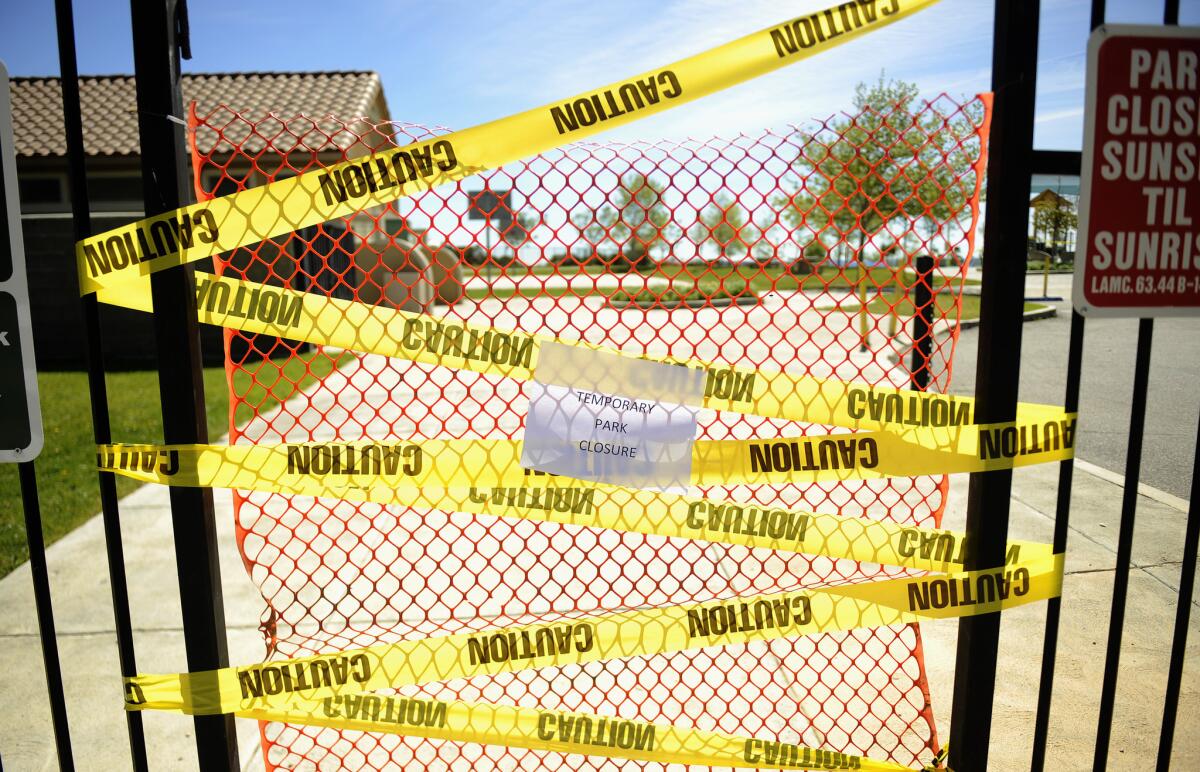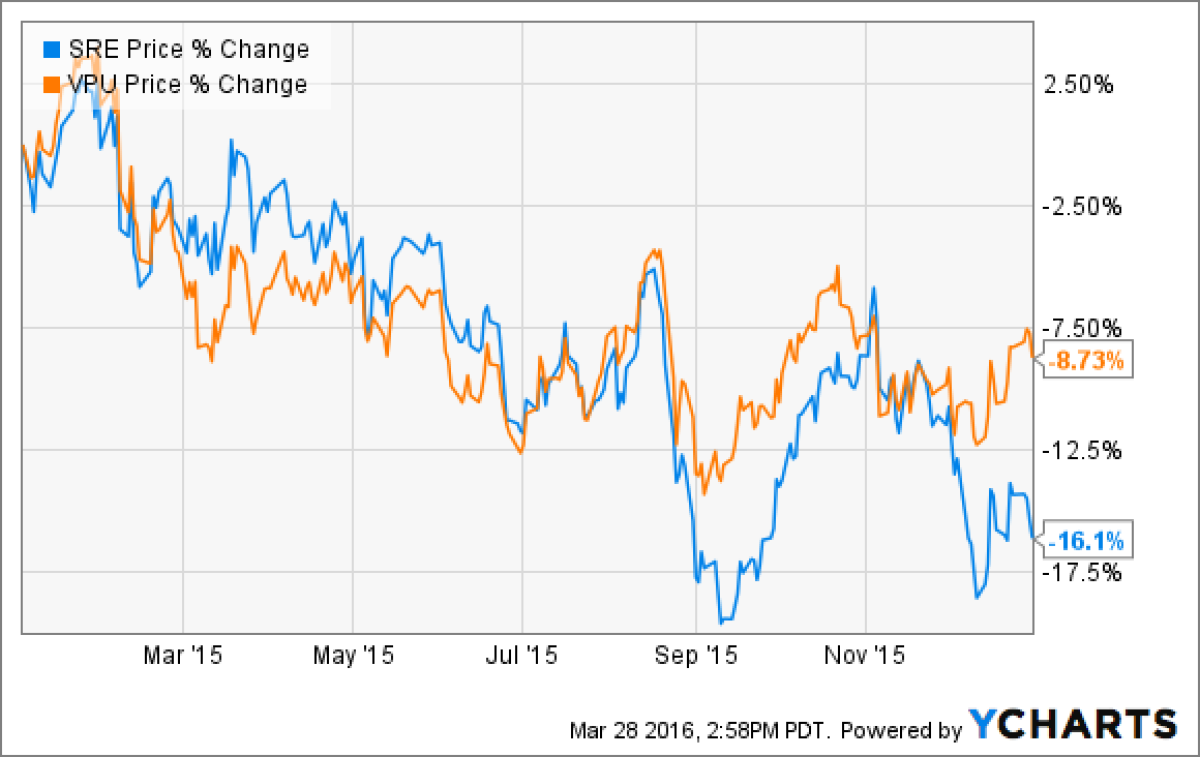Despite the Porter Ranch disaster, the top executive over SoCal Gas is getting an enormous bonus

- Share via
Given that the Porter Ranch gas leak ranks as the worst such leak in U.S. history, with the potential to measurably damage the climate, and forcing thousands of families out of their homes, you'll be glad to know that Debra L. Reed, chairman and CEO of the gas company's parent firm, Sempra Energy, has been docked part of her pay because of the episode.
But you may be appalled to hear that her penalty comes to all of $130,000, and that she's still getting a $3.17-million bonus. That's the largest bonus she's received since becoming CEO of Sempra in 2011 and adding the title of chairman in 2012, according to the company's proxy statement, dated last Friday. It brings her total compensation for 2015 to $16.1 million, meaning that her executive penalty for presiding over an elemental corporate fiasco comes to about eight tenths of 1% of her pay.
Others on Reed's management team also have been docked, according to the proxy. They are President Mark A. Snell, Executive V.P Steven D. Davis, CFO Joseph A. Householder and General Counsel Martha B. Wyrsch. Altogether, they're being deprived of about $157,000, but they're still getting about $3.9 million in bonuses, combined.
This sends out a signal that as long as the dollars are there, the impact on people, homes and the environment doesn't matter.
— Paula Cracium, president, Porter Ranch Neighborhood Council
If you're looking for evidence that American corporate executives are a truly privileged class, look no further.
"This sends out a signal that as long as the dollars are there, the impact on people, homes and the environment doesn't matter," Paula Cracium, president of the Porter Ranch Neighborhood Council, told me. "That's not the signal we need to send to executives who have so much power."
She's not alone in coming to that conclusion. "It’s an outrageous abdication of responsibility from the board and sends the worst possible message to the CEO, executives, investors and regulators about the company’s ability to minimize risk," Nell Minow, vice chair of ValueEdge Advisors, a corporate governance consulting firm, says of the Sempra board's compensation decision.
The Porter Ranch gas leak is a disaster of major proportions, any way you look at it. The nearly four-month leak -- it was discovered on Oct. 23 and not capped until Feb. 18 -- released roughly 100,000 tons of methane, effectively doubling the methane emissions rate of the entire Los Angeles Basin. Environmental expert Stephen Conley of UC Davis called it the biggest source of such pollution of the year and "definitely a monster."

Nor was it entirely a surprise to Southern California Gas Co. As my colleague Paige St. John has reported, the utility knew that wells in its storage fields, including the Aliso Canyon facility near Porter Ranch, were deteriorating and had been leaking more frequently since 2008. The wells posed a risk of "uncontrolled" failure, the utility told regulators in a 2014 request for a rate hike to test and replace failing wells. The request hasn't been approved by the Public Utilities Commission, but the PUC's position is that SoCal Gas should have been fixing the problem without waiting for the rate hike.
The disaster poses major risks to Sempra. Already, 83 lawsuits have been filed against SoCal Gas, with many more possible. The company acknowledges that SoCal Gas "also may incur significant liabilities for fines, penalties, damages and greenhouse gas mitigation activities as a result of this incident, some or a significant portion of which may not be recoverable through insurance." The company also faces regulatory fines and penalties, and even a criminal complaint from the Los Angeles County district attorney. The health consequences for thousands of residents are unclear. Legally speaking, the leak is a black hole that could suck Reed's operational record into the void.
The position of the Sempra board of directors, on the other hand, is that the Porter Ranch disaster is a "safety [and] customer satisfaction" issue warranting minimal penalties for the executives who presided over it. The board's discussion of its compensation policies is a pure distillation of the reality that corporate executives can collect huge raises despite underperformance in key areas.
How does this happen? It's the result of a daisy-chain culture among corporate executives who sit on each others' boards and judge each others' performance in a near-vacuum. Among the five members of the Sempra board's compensation committee are three ex-corporate CEOs; Reed herself is a board member of Caterpillar Inc., where she's a member of the compensation committee, and of Halliburton Co. (Does this leave her enough time to run Sempra?)
What plainly was most important to the Sempra board was the company's bottom line: In 2015, the holding company's net income reached $1.35 billion on revenue of $10.2 billion, a gain of 16% in profit over 2014. But the stock declined about 16% on the year, more than some utility stock benchmarks, with a late-year slide beginning soon after the leak was discovered.
As far as the compensation committee was concerned, Reed met her goals for 2015 -- Sempra exceeded the company's 2015 earnings guidance, completed some solar projects and filed its rate applications for the next three years with the PUC, and installed 4.5 million "smart meters" for SoCal Gas customers.
Yet the board's deliberations seemed to minimize the Porter Ranch leak. That suggests that safety and customer satisfaction is not even secondary as a consideration of Reed's performance -- these factors are not even mentioned among the CEO's seven goals for 2015. Yet the leak was the defining event in the year's performance. One would think that operating safely is Job One at a gas utility and a major debacle that lands in the record books would be a major black mark for corporate management.
But that doesn't seem to be the case.
Sempra's defense is that Reed's compensation goals were set in 2014, and the Porter Ranch leak wasn't discovered until more than nine months into the year. Company spokesman Doug Kline implies that more action could be taken on Reed's compensation once all the facts are in, but "the ... investigation is still under way."
That's certainly giving Reed and her management team the benefit of the doubt. Nothing stopped the compensation committee from putting Reed's bonus on hold until the investigation was complete, especially since there's evidence that knowledge of the problems with SoCal Gas's storage infrastructure grew under her watch, as did the failure to take prompt and decisive action. The Sempra board's attitude of wait-and-see is a dereliction of its duty to set proper standards for its CEO and chairman, and to hold her to it. If the directors don't understand that, why are they on the board?
Keep up to date with Michael Hiltzik. Follow @hiltzikm on Twitter, see his Facebook page, or email [email protected].
